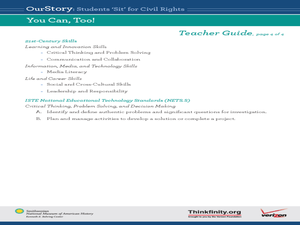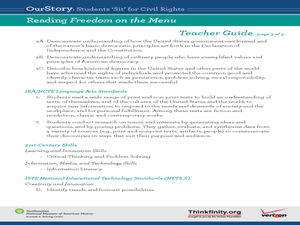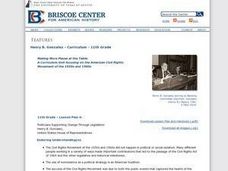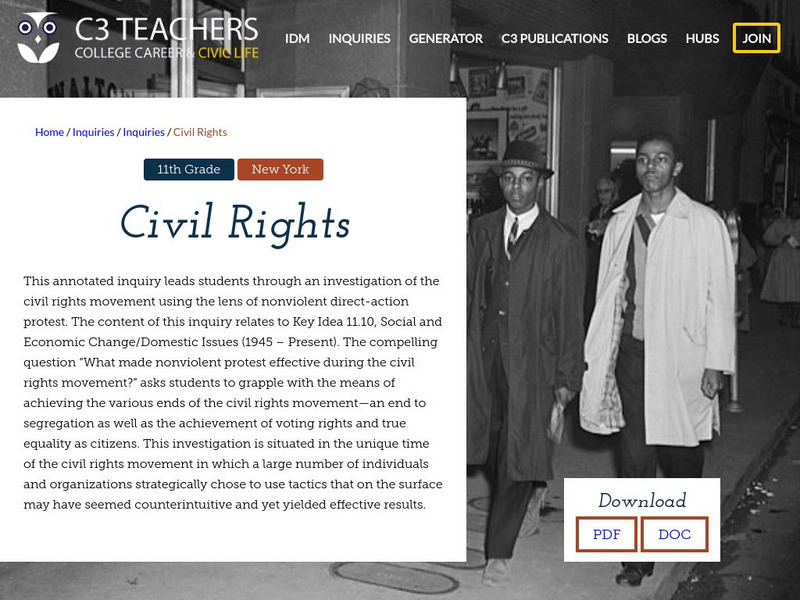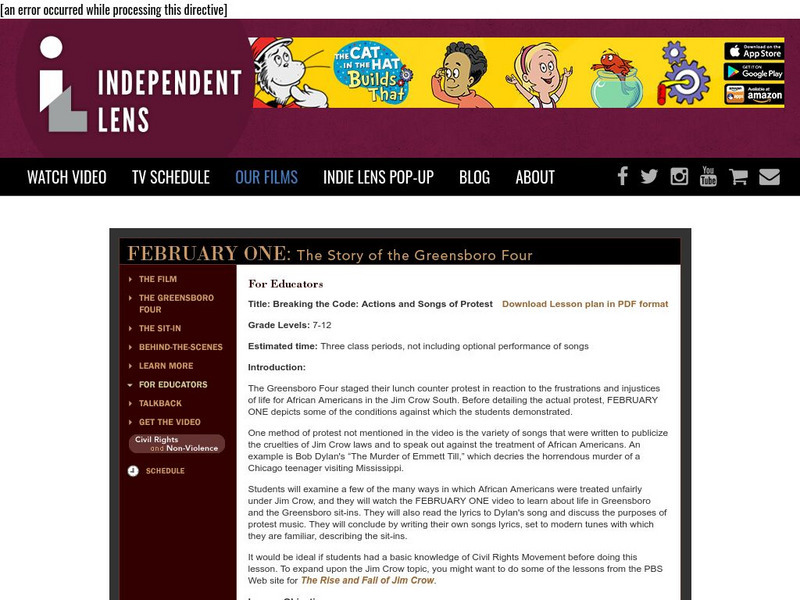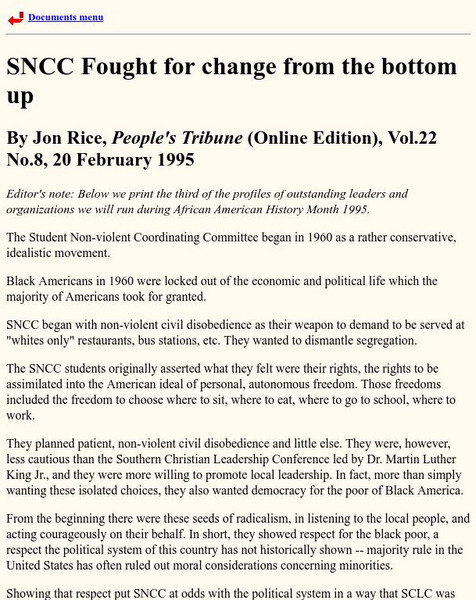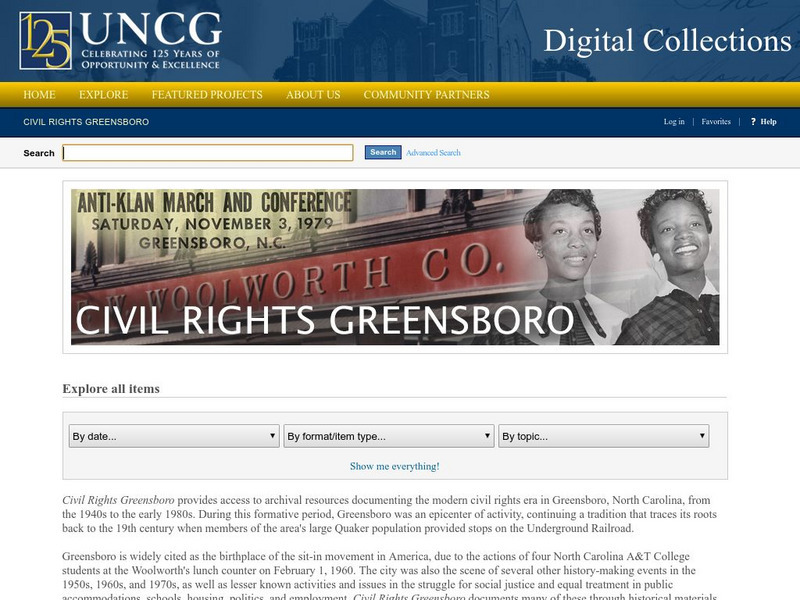Curated OER
You Can, Too!
Young scholars and their parents participate in a volunteer opportunity in their community in order to solve a problem. In this problem solving lesson plan, students reflect on historical problems and see how they can solve a current...
Curated OER
Aahimsa in the Real World: Identifying Ahimsa
Second graders become familiar with the use of the newspaper and how it educates people. In this ahimsa lesson, 2nd graders recognize the importance of Gandhi and his beliefs. Students read articles and answer questions about ahimsa.
Curated OER
Reading Freedom on the Menu
Young scholars apply specific reading strategies to answer questions about the selection Freedom on the Menu. In this reading comprehension lesson, students read a selection called Freedom on the Menu and use specific reading strategies...
Curated OER
Turbulent Times of the Sixties
Students explore 1960's America. In this American history lesson, students read about and research 1960's political and entertainment figures, social activism, the Civil Rights Movement, and environmentalism as they complete writing and...
Curated OER
Actively Organizing Passive Resistance
Students explore organizing to resist oppressive authority without the use of violence. In this philosophy lesson, students research Gandhi's approach to organizing people around a positive cause without the need to be aggressive or...
Curated OER
Chapter 23 – The Civil Rights Movement
In this U.S. history worksheet, students read assigned textbook pages on the Civil Rights Movement and respond to 48 short answer questions.
Curated OER
Brother Outsider
Students view the film "Brother Outsider" and read an article by Bayard Rustin as springboards to discuss the concept of civil rights in the United States. They follow a discussion guide.
Curated OER
Martin Luther King, Jr.
Students examine and discuss Dr. King's fight for equality and justice in the Civil Rights Movement. They locate words in a dictionary, read and interpret a poem about Martin Luther King, Jr., and discuss the holiday celebrated in his...
Curated OER
Making More Places at the Table: The American Civil Rights Movement of the 50's and 60's
Eleventh graders examine the biography of Henry B. Gonzalez. They examine primary source documents from Congressman Gonzalez's personal papers related to his contributions to the Civil Rights Movement.
Georgia Department of Education
Ga Virtual Learning: Nonviolent Resistance and Indian Independence
This is a lesson from a unit on 20th Century and Modern Poetry focuses on Mohondas Gandhi and his nonviolent resistance against British rule of India. It features links to Gandhi's biography, his ejection from a train in...
McMaster University
Mc Master University: Mahatma Gandhi Lectures on Nonviolence
The Centre for Peace Studies at McMaster University established the Mahatma Gandhi Lecture series to promote the values of nonviolent resistance. Most of the speeches, all by prominent activists and leaders, are available here.
Other
M. K. Gandhi Institute for Nonviolence
The M. K. Gandhi Institute for Nonviolence was founded by Arun Gandhi, fifth grandson of Mohandas Gandhi. Its aim is to promote Gandhi's nonviolent philosophy. There is a biography of Mohandas Gandhi, articles, links, and information...
C3 Teachers
C3 Teachers: Inquiries: Civil Rights
A learning module on the use of nonviolent protests during the civil rights movement. It includes several supporting questions accompanied by formative tasks and source materials, followed by a summative performance task. Topics covered...
Gilder Lehrman Institute of American History
Gilder Lehrman Institute: History Now: Nonviolent Direct Action at Southern Lunch Counters
[Free Registration/Login Required] A lesson plan that teaches about nonviolence and uses the civil rights lunch counter protests as examples.
PBS
Pbs News Hour Extra: Social Media and Non Violent Protest
Lesson plan tackles the turbulent events in Egypt and other Middle East countries by asking students to examine political cartoons and understand how social and traditional media served as a tool for the nonviolent protests. February, 2011
ibiblio
Ibiblio: Student Nonviolent Coordinating Committee
This ibiblio.org site gives the six-year history of this college based group that supported the civil rights movement and tells of its nonviolent philosophy.
Khan Academy
Khan Academy: Sncc and Core
Read about the Congress for Racial Equality (CORE) and the Student Nonviolent Coordinating Committee (SNCC), two groups that played pivotal roles in organizing nonviolent protests during the Civil Rights Movement of the 1950s and 1960s.
Khan Academy
Khan Academy: Us History: 1945 1980: Sncc and Core
Read about the two civil rights groups that organized nonviolent protests during the 1950s and 1960s.
PBS
Pbs Teachers: February One (Lessons on the Greensboro Sit in of 1960)
Find two lesson plans developed for a PBS documentary about the Greensboro Four, whose sit-in at a whites-only Woolworth's lunch counter was a key event in the unfolding history of the civil rights movement. The lessons ask students to...
Digital History
Digital History: Freedom Now
When four African American North Carolina Agricultural and Technical College students refused to leave the lunch-counter at the F.W. Woolworth store in Greensboro they started the first non-violent, "sit-in" movement. Although the...
Hartford Web Publishing
World History Archives: Sncc Fought for Change From the Bottom Up
A highly informative narrative on the development and philosophy of the Student Nonviolent Coordinating Committee, with comparisons to Dr. King's SCLC and the Black Panther Party. Good resource.
Other
Civil Rights Greensboro: Greensboro Sit Ins at Woolworth's
A very detailed description of the sit-ins at the Greensboro, North Carolina, Woolworth's store and other businesses in that city during the first part of 1960. These sit-ins were to call attention to the segregation of public businesses...
Other
Letter From Birminghham Jail [Pdf]
This letter shares Martin Luther King's reflections about his involvement in peaceful demonstrations. The letter provides historical information about the plight of African Americans throughout history and why he and others are so...
Center For Civic Education
Center for Civic Education: Black History Month
A collection of six lessons for Grades 5 and up for Black History Month. The lesson plans explore the use of nonviolence in history, particularly with respect to the civil rights movement and African American history.


